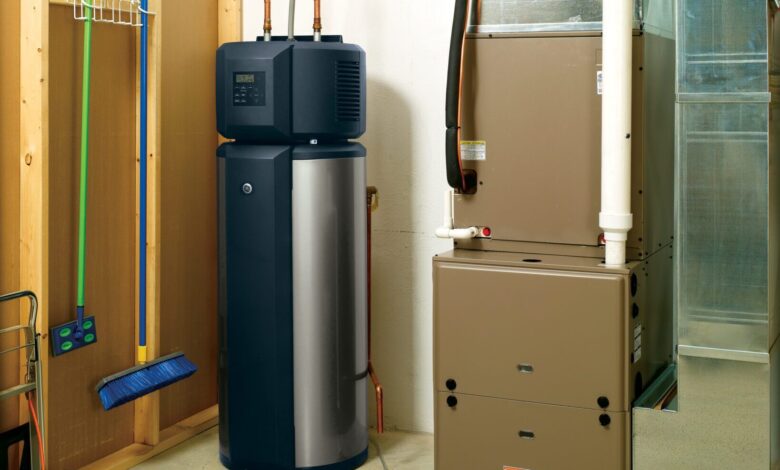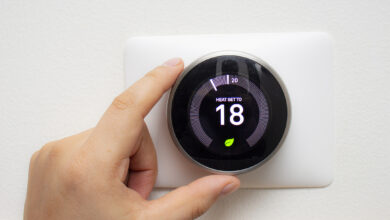
What is Heat Pump Water Heater
What is a heat pump water heater, and how does it work?
A heat pump water heater is an innovative and energy-efficient alternative to traditional water heaters. Unlike conventional water heaters that generate heat directly, heat pump water heaters utilize electricity to move heat from one place to another, making them significantly more efficient.
Here’s how it works:
- Heat Absorption: The heat pump water heater draws in ambient air from its surroundings using a fan. This air contains heat energy, even in cooler temperatures.
- Heat Transfer: The heat pump contains a refrigerant that absorbs the heat energy from the air. As the refrigerant evaporates, it turns into a gas, carrying the heat with it.
- Compression: The compressor within the heat pump compresses the heated refrigerant gas, causing its temperature to rise significantly.
- Heat Exchange: The hot refrigerant gas passes through a heat exchanger, transferring its heat to the water stored in the tank.
- Water Heating: As the heat is transferred to the water, it raises the temperature inside the tank, providing a steady supply of hot water for household use.
- Cooling and Condensation: Once the heat is transferred, the refrigerant returns to its liquid state as it releases the heat energy. It then circulates back to the evaporator to repeat the process.
Overall, the heat pump water heater operates on the principle of extracting heat from the surrounding air and transferring it to the water, making it an efficient and environmentally friendly option for heating water in residential and commercial settings.
What are the key factors to consider when choosing the best heat pump water heater?
When selecting the best heat pump water heater for your needs, several important factors should be taken into account to ensure optimal performance and efficiency. Here are the key considerations:
- Energy Efficiency: Look for a heat pump water heater with a high Energy Factor (EF) rating. A higher EF indicates greater efficiency, resulting in lower energy consumption and reduced operating costs over time.
- Capacity and Size: Determine the appropriate size of the water heater based on your household’s hot water usage. Consider factors such as the number of occupants, peak usage times, and the size of your home to ensure the water heater can meet your demand without unnecessary oversizing.
- Installation Requirements: Assess the installation requirements of the heat pump water heater, including space availability, electrical requirements, and ventilation needs. Ensure that your chosen location meets the manufacturer’s specifications for proper installation and operation.
- Noise Levels: Heat pump water heaters may produce some level of noise during operation, particularly from the compressor and fan. Consider models with sound-reducing features or opt for quieter units if noise is a concern, especially if the water heater will be installed in a living space or near bedrooms.
- Durability and Warranty: Evaluate the durability and reliability of the water heater, considering factors such as construction quality, corrosion resistance, and the length of the manufacturer’s warranty. Choose a reputable brand with a track record of producing reliable heat pump water heaters and offering comprehensive warranty coverage for peace of mind.
By carefully considering these key factors, you can make an informed decision when choosing the best heat pump water heater for your home or business, ensuring efficient and reliable hot water supply for years to come.
Which brands and models are considered the top performers in the market?
In the realm of heat pump water heaters, several brands and models have garnered recognition for their exceptional performance, energy efficiency, and reliability. Here are some top contenders in the market:
- Rheem: Rheem is a well-respected manufacturer known for producing high-quality heat pump water heaters. Their models often feature advanced technology, such as hybrid designs that combine heat pump and traditional heating elements for optimal efficiency.
- A.O. Smith: A.O. Smith offers a range of heat pump water heaters that prioritize energy savings and performance. Their units are designed to deliver consistent hot water while minimizing energy consumption, making them a popular choice among homeowners and businesses alike.
- Bradford White: Bradford White is another reputable brand known for its durable and efficient heat pump water heaters. Their models boast innovative features such as touchscreen controls, leak detection systems, and durable construction for long-lasting performance.
- GE Appliances: GE Appliances offers a variety of heat pump water heaters designed to meet the needs of different households and budgets. Their units are known for their reliability, energy efficiency, and user-friendly features, making them a popular choice for residential applications.
- Stiebel Eltron: Stiebel Eltron specializes in energy-efficient heating solutions, including heat pump water heaters. Their models incorporate cutting-edge technology to maximize energy savings while providing reliable hot water supply for residential and commercial use.
When considering the best heat pump water heater for your needs, it’s essential to research and compare different brands and models to find the one that aligns with your requirements in terms of capacity, efficiency, features, and budget. Additionally, reading customer reviews and seeking recommendations from professionals can help you make an informed decision and ensure that you select a top-performing unit that meets your expectations.
How do heat pump water heaters compare to traditional water heaters in terms of efficiency and cost-effectiveness?
Heat pump water heaters offer several advantages over traditional water heaters, particularly in terms of efficiency and cost-effectiveness. Here’s how they compare:
- Energy Efficiency: Heat pump water heaters are significantly more energy-efficient than traditional water heaters, such as electric resistance or gas-powered models. By extracting heat from the surrounding air and transferring it to the water, heat pump water heaters can achieve higher Energy Factor (EF) ratings, resulting in lower energy consumption and reduced utility bills.
- Operating Costs: While heat pump water heaters may have a higher upfront cost compared to traditional water heaters, they can provide substantial long-term savings through reduced energy consumption. The lower operating costs associated with heat pump water heaters can offset the initial investment over time, making them a cost-effective choice for homeowners looking to save money on their utility bills.
- Environmental Impact: Heat pump water heaters are more environmentally friendly than traditional water heaters, as they use electricity to transfer heat rather than burning fossil fuels. By reducing energy consumption and greenhouse gas emissions, heat pump water heaters contribute to a greener and more sustainable future.
- Performance and Reliability: Heat pump water heaters typically offer comparable performance and reliability to traditional water heaters, providing a consistent hot water supply for household use. However, proper installation, maintenance, and sizing are essential to ensure optimal performance and longevity, regardless of the type of water heater.
- Location and Installation: Heat pump water heaters may have specific installation requirements, such as adequate space, ventilation, and ambient air temperature. While they can be installed indoors or outdoors, proper placement and installation are critical to maximizing efficiency and performance. Traditional water heaters, on the other hand, may offer more flexibility in terms of installation location but may be limited by venting requirements and fuel availability.
Overall, heat pump water heaters offer superior energy efficiency, cost-effectiveness, and environmental benefits compared to traditional water heaters. While they may require a higher initial investment and careful consideration of installation requirements, the long-term savings, and reduced environmental impact make them a compelling choice for homeowners seeking efficient and sustainable hot water solutions.
